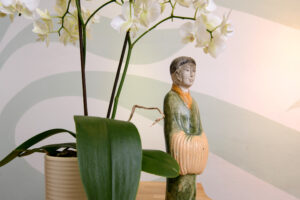Acupuncture for migraine and headache is a treatment that practitioners often get asked for, both as a means of treating acute symptoms or, more commonly, as a longer-term preventative option for chronic sufferers.
An estimated six million people in the UK suffer from migraines with greater incidence among females. The definitions of what are headaches and migraines are very closely related.
Almost everybody will suffer from a headache at some stage. Unfortunately, some people suffer from them more frequently and more painfully than others. Sometimes people may suffer from them in clusters that may last several weeks before remission.

Treatment with acupuncture for migraine and headache is common
Migraines involve spasm followed by extreme dilation of arteries serving the brain that causes the characteristic throbbing. Commonly, this pain is unilateral, affecting one side of the head, at least initially. Migraines may be accompanied by symptoms other than the head pain. These include visual disturbance, known as an aura, weakness in the limbs, nausea and vomiting, and photophobia (sensitivity to light). It is possible to suffer from types of migraine that do not include any headache.
Migraine susceptibility often runs in families. Triggers can be specific to individual sufferers, but there are some common ones – certain foods, such as tomatoes, dairy, chocolate, and oranges, food additives such as tartrazine, alcohol consumption, stress, and hormonal changes particularly at the pre-menstrual part of the cycle.
Non-migrainous headaches often involve prolonged contraction of certain muscle groups, such as in the neck or the scalp or around the eyes. Bruxism (teeth grinding) can be a cause with tension in the masseter muscles transferring to the temporalis muscle higher up.
Unlike migraines, cluster headaches disproportionately affect males. They typically involve severe pain situated close to the eye and, as the name suggests, coming in periodic clusters every few weeks or months. They can often be accompanied by eye symptoms, such as redness and watering.
There are various medical conditions that may cause headaches, such as sinusitis, glaucoma, medication or indeed cessation of medication, and chronic inflammation. Of course, excessive consumption of alcohol or coffee or withdrawal from high coffee consumption can cause headaches. Stress and tiredness are probably the two most common causes of headaches.
Although the sensation of migraines and headaches is that of pain deep within the skull, the brain actually possesses no sensory receptors, and the cause is almost always found either in the muscles or the meninges (tissue membranes enclosing the brain and spinal cord). However, in very rare cases, headaches may be a symptom of a major underlying health condition.
Further information for acupuncture for migraine sufferers is available at the migraine trust.
To find out more about Mark’s newest clinic in London, click here.





